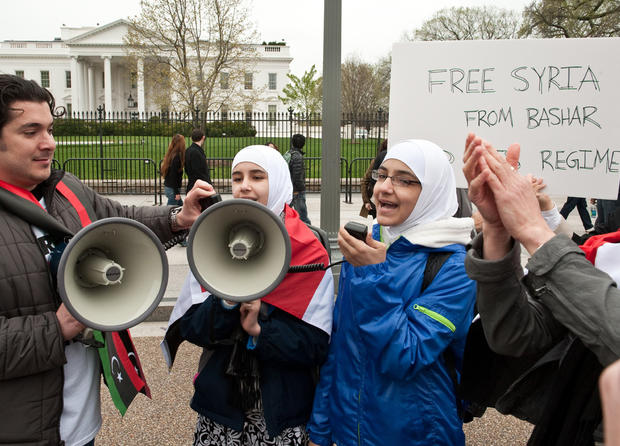U.S. treads cautiously amid Syria violence
The Obama administration is considering new "targeted sanctions" against Syria as part of "a range of possible policy options," in the face of a continued, bloody crackdown on its citizens by the regime of President Bashar Assad.
On Monday White House spokesman Tommy Vietor condemned the Syrian government, calling violence waged against citizens "completely deplorable."
The U.S. State Department has also told American citizens to leave Syria as soon as possible and is ordering personnel at the U.S. Embassy in Damascus to leave the country.
But Washington hasn't been taking a more forceful stance on Syria out of fears of further destabilizing the region, said CBS News senior White House correspondent Bill Plante.
"It's a question of geography," Plante said on CBS' "The Early Show." "Syria sits on a border with Israel and Jordan on one side and Iraq on the other. There's huge concern here about destabilizing Syria and what would happen if that were to take place. That's one reason you're not hearing calls from other Arab nations to intervene in Syria, the way we heard them when the uprising started in Libya.
"The only thing the U.S. has done is to move to consider further sanctions. There have been sanctions on Syria since 2004. The White House is now talking about putting new sanctions on members of the Assad family, travel bans and asset freezes. And they say they're doing this with a great sense of urgency. But at the moment, that's all they're doing.
"President Obama has made it a point in his administration to try and make some kind of an agreement with Syria in order to get them to make peace with Israel and stop providing haven for terrorists in Syria. That has not worked. All of this fighting in Syria makes any kind of agreement with them even less likely."
Gunfire persists after bloody Syria raid
Complete coverage: Anger in the Arab World
Sectarian differences in Syria - the ruling Shia Muslims vs. the majority Sunnis - also add to the complexities. Plante said there is fear that the country could degenerate into the kind of sectarian fighting that's happened in other places of the Middle East.
Also on "The Early Show," CBS News correspondent Barry Petersen said that, unlike Egypt where the military sided with protesters - or at least allowed demonstrations against the Mubarak regime to continue - the military in Syria would not support citizens protesting the government.
"Many in the Syrian military are members of the same Shia sect as the president, Bashir al Assad," he explained. "They're fighting not just for him, but to keep themselves in power."
